Importance of Leadership in Healthcare Administration Essay
VerifiedAdded on 2022/09/02
|5
|913
|21
Essay
AI Summary
This essay analyzes the critical role of leadership in healthcare administration, emphasizing leadership styles and their impact on organizational success and patient outcomes. It highlights the importance of leadership values, including integrity and emotional intelligence, and differentiates between leadership and management. The essay explores transactional, transformational, and servant leadership styles, advocating for a collaborative approach. Furthermore, it addresses ethical dilemmas faced by healthcare administrators, particularly concerning workforce sustainability and end-of-life decision-making. The essay concludes by emphasizing the importance of effective leadership in strengthening the quality and integration of healthcare within clinical settings, referencing relevant literature to support its arguments.
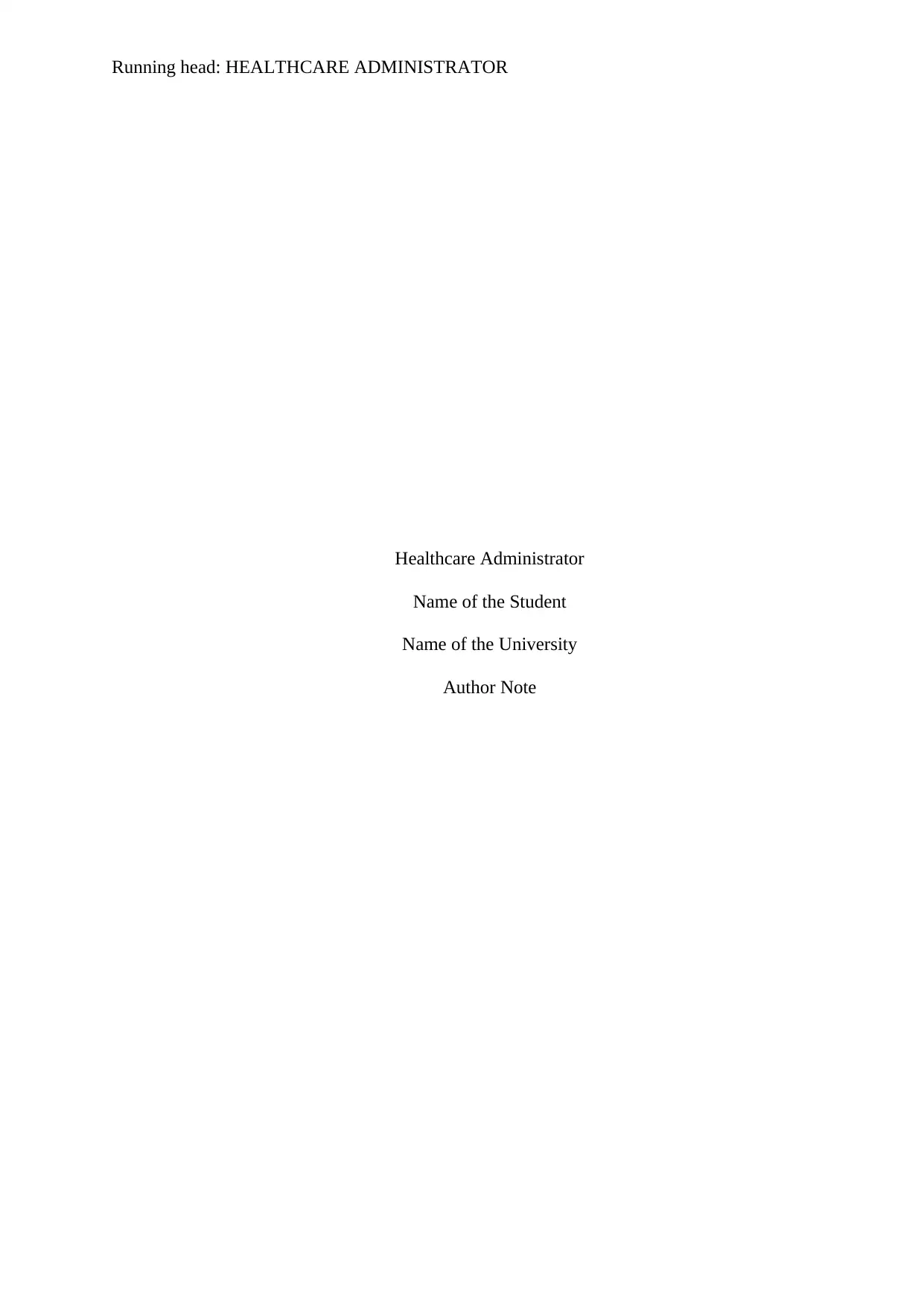
Running head: HEALTHCARE ADMINISTRATOR
Healthcare Administrator
Name of the Student
Name of the University
Author Note
Healthcare Administrator
Name of the Student
Name of the University
Author Note
Paraphrase This Document
Need a fresh take? Get an instant paraphrase of this document with our AI Paraphraser
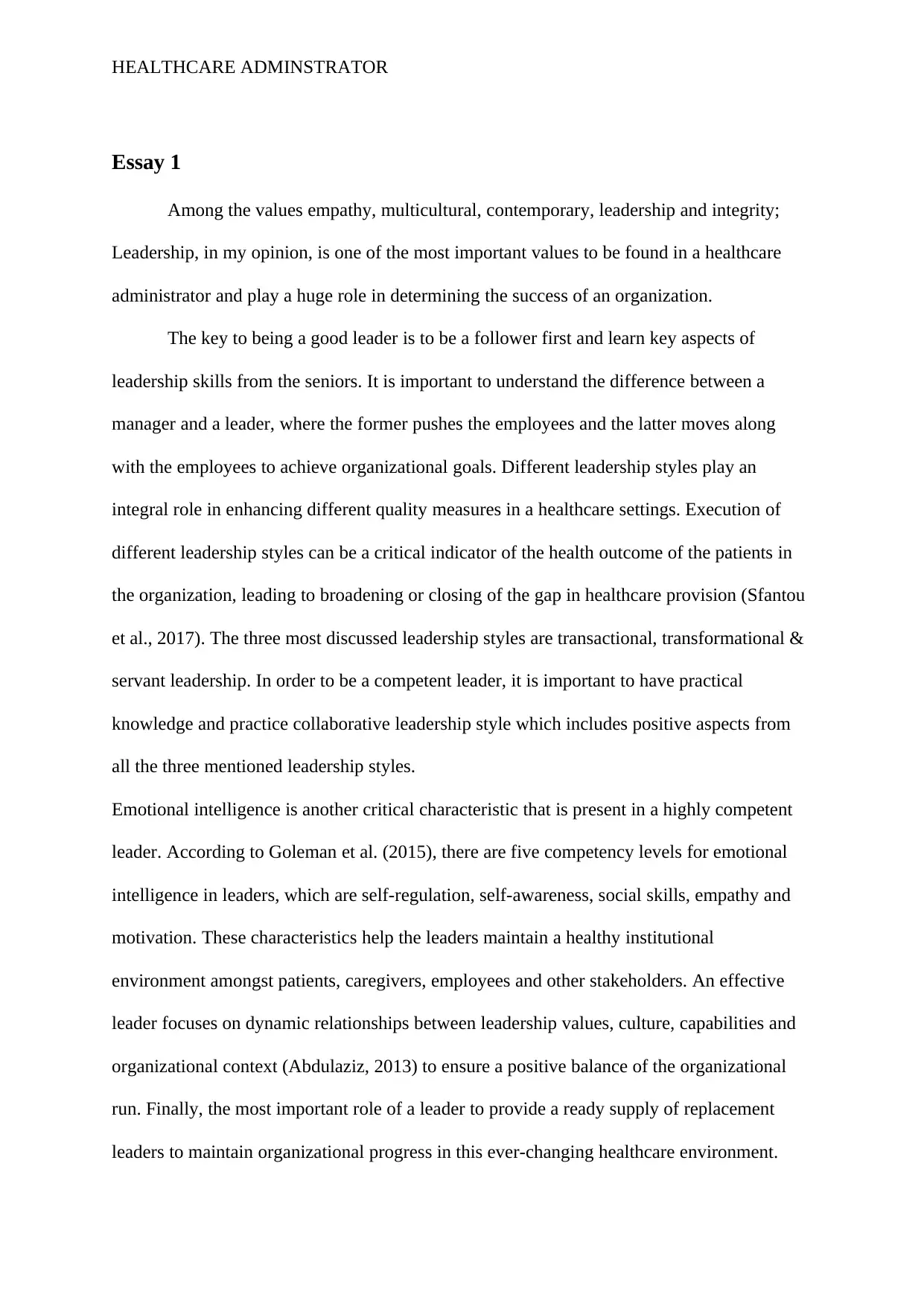
HEALTHCARE ADMINSTRATOR
Essay 1
Among the values empathy, multicultural, contemporary, leadership and integrity;
Leadership, in my opinion, is one of the most important values to be found in a healthcare
administrator and play a huge role in determining the success of an organization.
The key to being a good leader is to be a follower first and learn key aspects of
leadership skills from the seniors. It is important to understand the difference between a
manager and a leader, where the former pushes the employees and the latter moves along
with the employees to achieve organizational goals. Different leadership styles play an
integral role in enhancing different quality measures in a healthcare settings. Execution of
different leadership styles can be a critical indicator of the health outcome of the patients in
the organization, leading to broadening or closing of the gap in healthcare provision (Sfantou
et al., 2017). The three most discussed leadership styles are transactional, transformational &
servant leadership. In order to be a competent leader, it is important to have practical
knowledge and practice collaborative leadership style which includes positive aspects from
all the three mentioned leadership styles.
Emotional intelligence is another critical characteristic that is present in a highly competent
leader. According to Goleman et al. (2015), there are five competency levels for emotional
intelligence in leaders, which are self-regulation, self-awareness, social skills, empathy and
motivation. These characteristics help the leaders maintain a healthy institutional
environment amongst patients, caregivers, employees and other stakeholders. An effective
leader focuses on dynamic relationships between leadership values, culture, capabilities and
organizational context (Abdulaziz, 2013) to ensure a positive balance of the organizational
run. Finally, the most important role of a leader to provide a ready supply of replacement
leaders to maintain organizational progress in this ever-changing healthcare environment.
Essay 1
Among the values empathy, multicultural, contemporary, leadership and integrity;
Leadership, in my opinion, is one of the most important values to be found in a healthcare
administrator and play a huge role in determining the success of an organization.
The key to being a good leader is to be a follower first and learn key aspects of
leadership skills from the seniors. It is important to understand the difference between a
manager and a leader, where the former pushes the employees and the latter moves along
with the employees to achieve organizational goals. Different leadership styles play an
integral role in enhancing different quality measures in a healthcare settings. Execution of
different leadership styles can be a critical indicator of the health outcome of the patients in
the organization, leading to broadening or closing of the gap in healthcare provision (Sfantou
et al., 2017). The three most discussed leadership styles are transactional, transformational &
servant leadership. In order to be a competent leader, it is important to have practical
knowledge and practice collaborative leadership style which includes positive aspects from
all the three mentioned leadership styles.
Emotional intelligence is another critical characteristic that is present in a highly competent
leader. According to Goleman et al. (2015), there are five competency levels for emotional
intelligence in leaders, which are self-regulation, self-awareness, social skills, empathy and
motivation. These characteristics help the leaders maintain a healthy institutional
environment amongst patients, caregivers, employees and other stakeholders. An effective
leader focuses on dynamic relationships between leadership values, culture, capabilities and
organizational context (Abdulaziz, 2013) to ensure a positive balance of the organizational
run. Finally, the most important role of a leader to provide a ready supply of replacement
leaders to maintain organizational progress in this ever-changing healthcare environment.
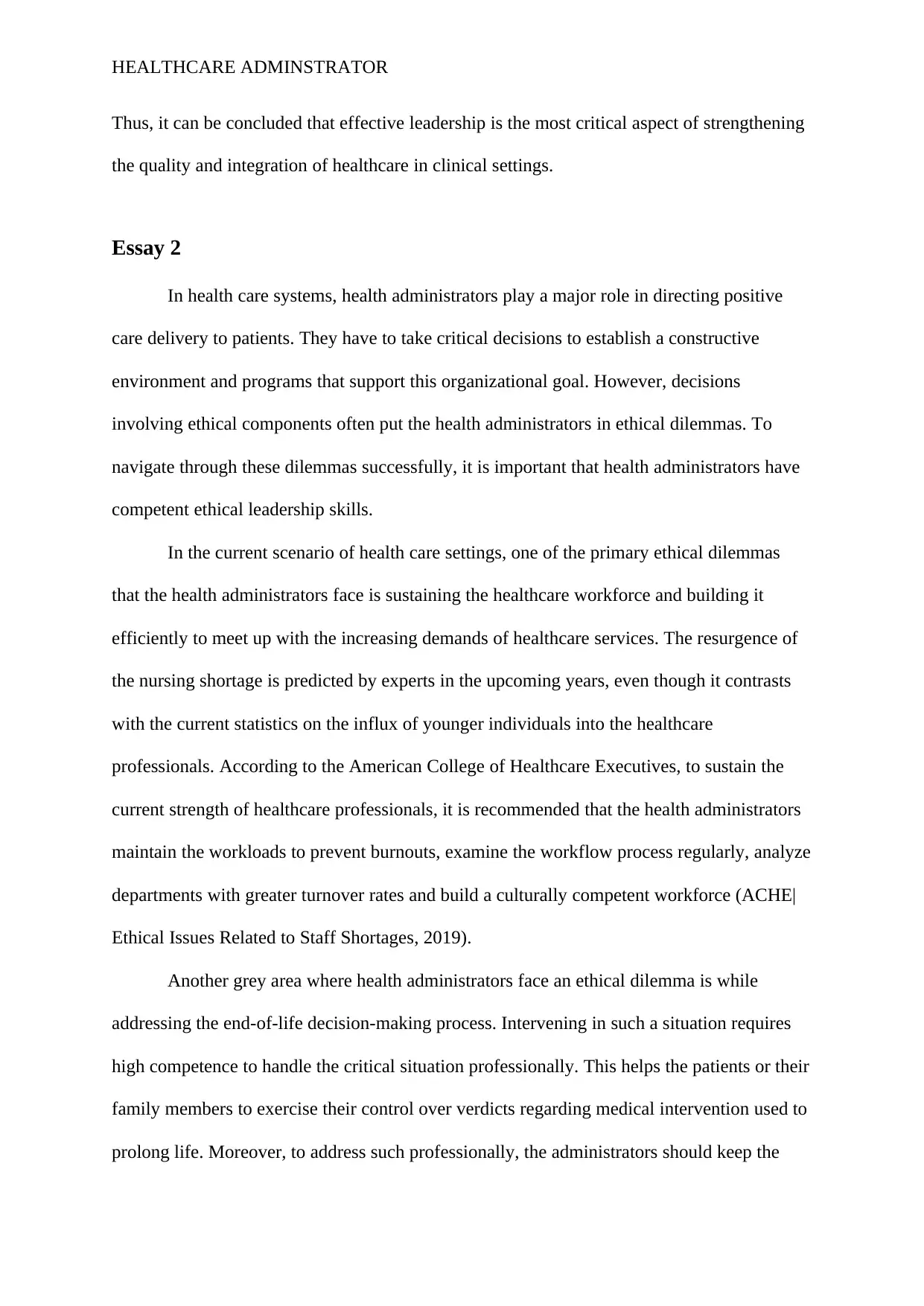
HEALTHCARE ADMINSTRATOR
Thus, it can be concluded that effective leadership is the most critical aspect of strengthening
the quality and integration of healthcare in clinical settings.
Essay 2
In health care systems, health administrators play a major role in directing positive
care delivery to patients. They have to take critical decisions to establish a constructive
environment and programs that support this organizational goal. However, decisions
involving ethical components often put the health administrators in ethical dilemmas. To
navigate through these dilemmas successfully, it is important that health administrators have
competent ethical leadership skills.
In the current scenario of health care settings, one of the primary ethical dilemmas
that the health administrators face is sustaining the healthcare workforce and building it
efficiently to meet up with the increasing demands of healthcare services. The resurgence of
the nursing shortage is predicted by experts in the upcoming years, even though it contrasts
with the current statistics on the influx of younger individuals into the healthcare
professionals. According to the American College of Healthcare Executives, to sustain the
current strength of healthcare professionals, it is recommended that the health administrators
maintain the workloads to prevent burnouts, examine the workflow process regularly, analyze
departments with greater turnover rates and build a culturally competent workforce (ACHE|
Ethical Issues Related to Staff Shortages, 2019).
Another grey area where health administrators face an ethical dilemma is while
addressing the end-of-life decision-making process. Intervening in such a situation requires
high competence to handle the critical situation professionally. This helps the patients or their
family members to exercise their control over verdicts regarding medical intervention used to
prolong life. Moreover, to address such professionally, the administrators should keep the
Thus, it can be concluded that effective leadership is the most critical aspect of strengthening
the quality and integration of healthcare in clinical settings.
Essay 2
In health care systems, health administrators play a major role in directing positive
care delivery to patients. They have to take critical decisions to establish a constructive
environment and programs that support this organizational goal. However, decisions
involving ethical components often put the health administrators in ethical dilemmas. To
navigate through these dilemmas successfully, it is important that health administrators have
competent ethical leadership skills.
In the current scenario of health care settings, one of the primary ethical dilemmas
that the health administrators face is sustaining the healthcare workforce and building it
efficiently to meet up with the increasing demands of healthcare services. The resurgence of
the nursing shortage is predicted by experts in the upcoming years, even though it contrasts
with the current statistics on the influx of younger individuals into the healthcare
professionals. According to the American College of Healthcare Executives, to sustain the
current strength of healthcare professionals, it is recommended that the health administrators
maintain the workloads to prevent burnouts, examine the workflow process regularly, analyze
departments with greater turnover rates and build a culturally competent workforce (ACHE|
Ethical Issues Related to Staff Shortages, 2019).
Another grey area where health administrators face an ethical dilemma is while
addressing the end-of-life decision-making process. Intervening in such a situation requires
high competence to handle the critical situation professionally. This helps the patients or their
family members to exercise their control over verdicts regarding medical intervention used to
prolong life. Moreover, to address such professionally, the administrators should keep the
⊘ This is a preview!⊘
Do you want full access?
Subscribe today to unlock all pages.

Trusted by 1+ million students worldwide
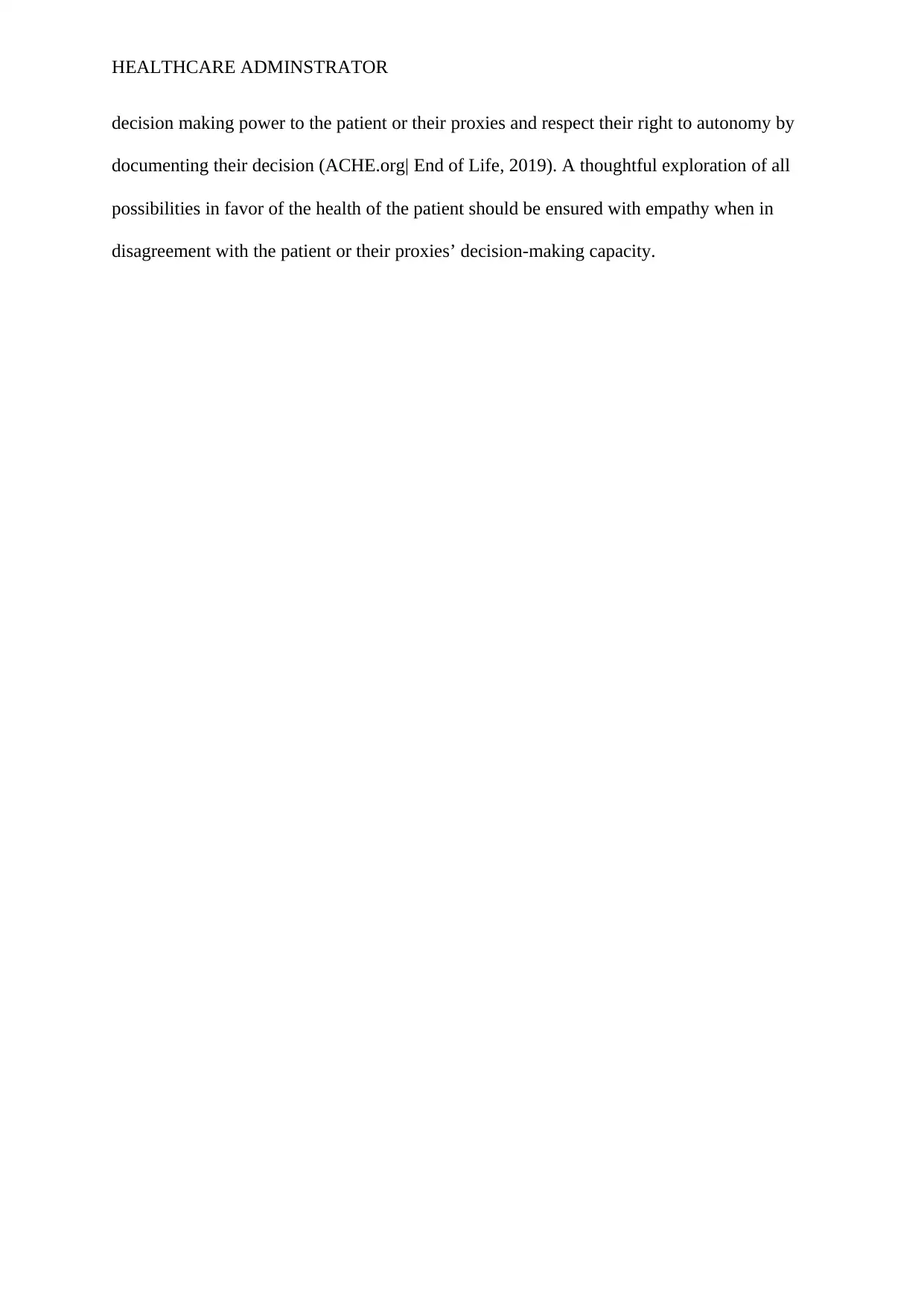
HEALTHCARE ADMINSTRATOR
decision making power to the patient or their proxies and respect their right to autonomy by
documenting their decision (ACHE.org| End of Life, 2019). A thoughtful exploration of all
possibilities in favor of the health of the patient should be ensured with empathy when in
disagreement with the patient or their proxies’ decision-making capacity.
decision making power to the patient or their proxies and respect their right to autonomy by
documenting their decision (ACHE.org| End of Life, 2019). A thoughtful exploration of all
possibilities in favor of the health of the patient should be ensured with empathy when in
disagreement with the patient or their proxies’ decision-making capacity.
Paraphrase This Document
Need a fresh take? Get an instant paraphrase of this document with our AI Paraphraser
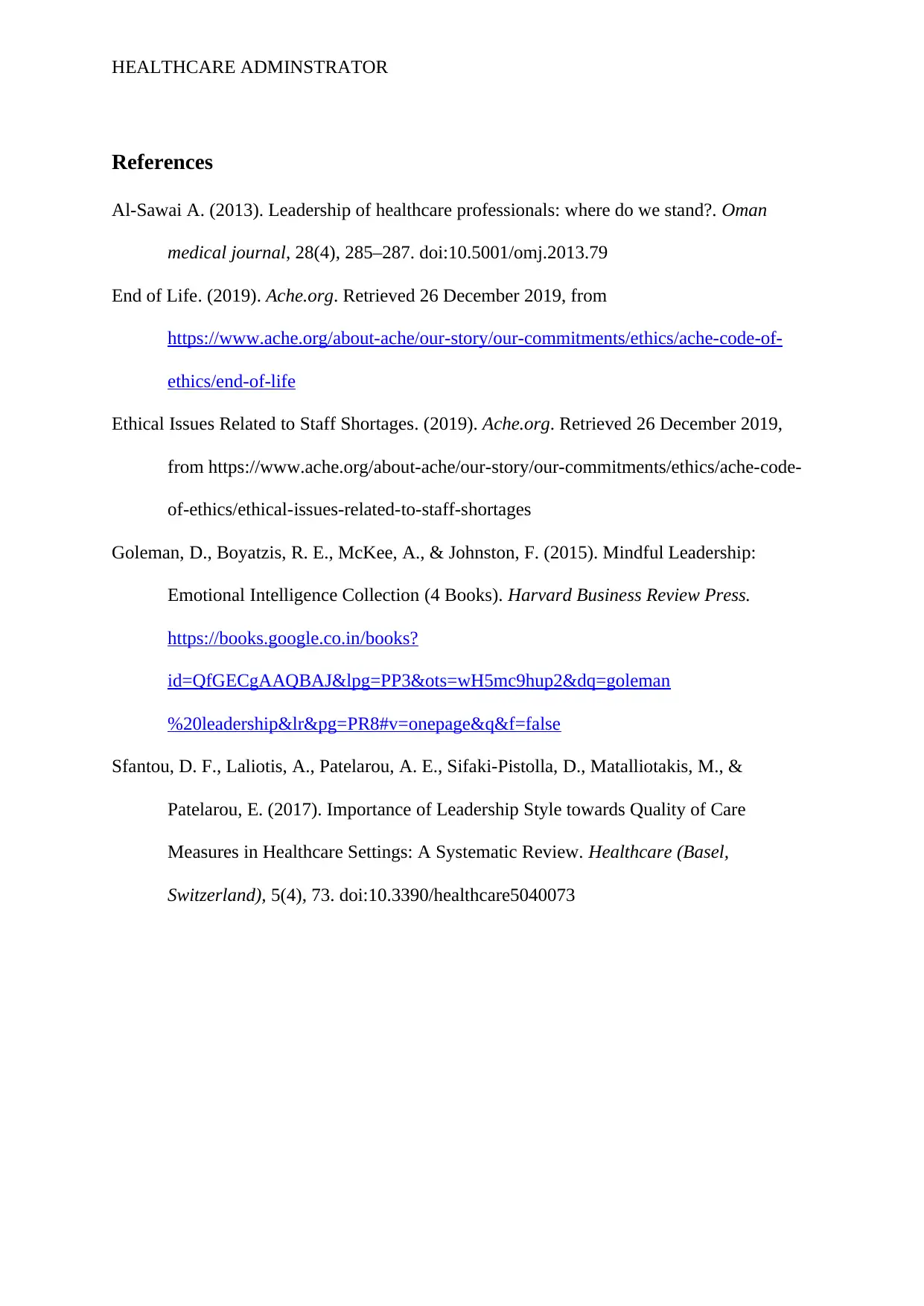
HEALTHCARE ADMINSTRATOR
References
Al-Sawai A. (2013). Leadership of healthcare professionals: where do we stand?. Oman
medical journal, 28(4), 285–287. doi:10.5001/omj.2013.79
End of Life. (2019). Ache.org. Retrieved 26 December 2019, from
https://www.ache.org/about-ache/our-story/our-commitments/ethics/ache-code-of-
ethics/end-of-life
Ethical Issues Related to Staff Shortages. (2019). Ache.org. Retrieved 26 December 2019,
from https://www.ache.org/about-ache/our-story/our-commitments/ethics/ache-code-
of-ethics/ethical-issues-related-to-staff-shortages
Goleman, D., Boyatzis, R. E., McKee, A., & Johnston, F. (2015). Mindful Leadership:
Emotional Intelligence Collection (4 Books). Harvard Business Review Press.
https://books.google.co.in/books?
id=QfGECgAAQBAJ&lpg=PP3&ots=wH5mc9hup2&dq=goleman
%20leadership&lr&pg=PR8#v=onepage&q&f=false
Sfantou, D. F., Laliotis, A., Patelarou, A. E., Sifaki-Pistolla, D., Matalliotakis, M., &
Patelarou, E. (2017). Importance of Leadership Style towards Quality of Care
Measures in Healthcare Settings: A Systematic Review. Healthcare (Basel,
Switzerland), 5(4), 73. doi:10.3390/healthcare5040073
References
Al-Sawai A. (2013). Leadership of healthcare professionals: where do we stand?. Oman
medical journal, 28(4), 285–287. doi:10.5001/omj.2013.79
End of Life. (2019). Ache.org. Retrieved 26 December 2019, from
https://www.ache.org/about-ache/our-story/our-commitments/ethics/ache-code-of-
ethics/end-of-life
Ethical Issues Related to Staff Shortages. (2019). Ache.org. Retrieved 26 December 2019,
from https://www.ache.org/about-ache/our-story/our-commitments/ethics/ache-code-
of-ethics/ethical-issues-related-to-staff-shortages
Goleman, D., Boyatzis, R. E., McKee, A., & Johnston, F. (2015). Mindful Leadership:
Emotional Intelligence Collection (4 Books). Harvard Business Review Press.
https://books.google.co.in/books?
id=QfGECgAAQBAJ&lpg=PP3&ots=wH5mc9hup2&dq=goleman
%20leadership&lr&pg=PR8#v=onepage&q&f=false
Sfantou, D. F., Laliotis, A., Patelarou, A. E., Sifaki-Pistolla, D., Matalliotakis, M., &
Patelarou, E. (2017). Importance of Leadership Style towards Quality of Care
Measures in Healthcare Settings: A Systematic Review. Healthcare (Basel,
Switzerland), 5(4), 73. doi:10.3390/healthcare5040073
1 out of 5
Related Documents
Your All-in-One AI-Powered Toolkit for Academic Success.
+13062052269
info@desklib.com
Available 24*7 on WhatsApp / Email
![[object Object]](/_next/static/media/star-bottom.7253800d.svg)
Unlock your academic potential
Copyright © 2020–2025 A2Z Services. All Rights Reserved. Developed and managed by ZUCOL.





